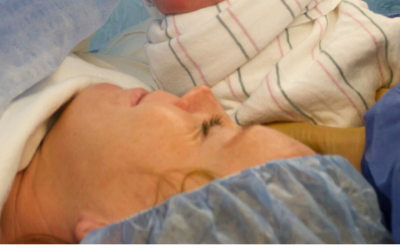
Peter Joseph Pappas Research Grant Program Announces 2020 Award Recipients
Melbourne, FL – January 30, 2020 – The Preeclampsia Foundation announced the recipients of its 2020 Peter Joseph Pappas Research Grants, a funding program designed to accelerate preeclampsia research. Based on the recommendations of its Preeclampsia Registry Advisory Council Advisory Council, the Preeclampsia Foundation awarded two grants totaling $184,624 to Dr. Virginia D. Winn, MD, PhD and Julia Fridman Simard, ScD. Both researchers are from Stanford University in California..jpg)
Dr. Virginia D. Winn, MD, PhD, Associate Professor of Obstetrics and Gynecology and Director of Perinatal Biology at Stanford University will serve as Principal Investigator for a research proposal entitled, Determining Heme oxygenase-1 genotype contribution to endothelial dysfunction in preeclampsia.
A large body of evidence is accumulating supporting the importance of heme oxygenase-1 (HO-1) in endothelial function and the development of preeclampsia. This study will seek to determine the extent to which HO-1 promoter genotypes differ between women with preeclampsia and the general population, how genotype correlates with clinical presentation, and if the different expressions of HO-1, as the result of known human genetic variants, alters the intrinsic and responsive functional capacity of endothelial cells. Establishing relationship between HO-1 and endothelial cell function could provide key insights into the development of preeclampsia and reveal potential therapeutic strategies.
 Principal Investigator Julia Fridman Simard, ScD is Assistant Professor in the Department of Epidemiology and Population Health at Stanford University School of Medicine. Her study is entitled, Learning about Preeclampsia from High-Risk Pregnancy. Pregnant women with lupus are at particularly high risk for preeclampsia and preterm delivery. Using a large population-based administrative claims database, her team’s work will evaluate the effectiveness of a common lupus treatment, hydroxychloroquine, in the prevention of preeclampsia. Hydroxychloroquine (HCQ) has been proposed as a potential preeclampsia treatment in the general population as it may interrupt the development of preeclampsia by mitigating oxidative stress and targeting toll-like receptors to prevent pro-inflammatory cytokine production. The general pregnant population rarely uses HCQ, making comparative effectiveness studies of existing data impossible. This study will systematically examine a US population-based administrative health claims database with over 43 million individuals to see whether pregnant women with lupus who use HCQ have less preeclampsia and, consequently, less preterm delivery.
Principal Investigator Julia Fridman Simard, ScD is Assistant Professor in the Department of Epidemiology and Population Health at Stanford University School of Medicine. Her study is entitled, Learning about Preeclampsia from High-Risk Pregnancy. Pregnant women with lupus are at particularly high risk for preeclampsia and preterm delivery. Using a large population-based administrative claims database, her team’s work will evaluate the effectiveness of a common lupus treatment, hydroxychloroquine, in the prevention of preeclampsia. Hydroxychloroquine (HCQ) has been proposed as a potential preeclampsia treatment in the general population as it may interrupt the development of preeclampsia by mitigating oxidative stress and targeting toll-like receptors to prevent pro-inflammatory cytokine production. The general pregnant population rarely uses HCQ, making comparative effectiveness studies of existing data impossible. This study will systematically examine a US population-based administrative health claims database with over 43 million individuals to see whether pregnant women with lupus who use HCQ have less preeclampsia and, consequently, less preterm delivery.
Named for the infant son of preeclampsia survivor Lauren Pappas and her husband Clement, the Peter Joseph Pappas Research Grants program award grants totaling up to $200,000 each year. The goal of the program is to drive research that will eliminate the delivery of pre-term babies as an intervention for severe preeclampsia, HELLP syndrome, and related hypertensive disorders of pregnancy.
“We lost our son Peter due to preeclampsia following a 29-week delivery in 2015,” explained Lauren Pappas. “Since then we have dedicated our lives to helping others avoid the same outcome by establishing the Peter Joseph Pappas Fund.”
“Thanks to generous contributions from family and friends, and our partnership with the Preeclampsia Foundation, we are making strides to reach our ultimate goal of eliminating pre-term births due to preeclampsia by 2050,” added Clement Pappas.
The Peter Joseph Pappas Research Grants program adds to the Preeclampsia Foundation’s portfolio of research programs including the Vision Grant program for young investigators, PRIME for health services research, and EMPOWER, which helps build research capacity in low- and middle-income countries. Recipients of the Peter Joseph Pappas grants frequently utilize data available through the Preeclampsia Registry™, the Preeclampsia Foundation’s dynamic database of research participants that includes preeclampsia and HELLP syndrome survivors, family members, and controls (unaffected individuals).
Original article: January 30, 2020; updated: February 4, 2026.
Our mission is to find a cure for preeclampsia and other related hypertensive disorders of pregnancy. Join us and apply for funding to help us save moms and their babies.
Related Articles

Your story is needed to improve outcomes for moms like you. Add your voice to critical preeclampsia research to ensure that every story is heard.

Frequently asked questions about the Preeclampsia Registry, a patient-driven registry and biobank.

The Preeclampsia Foundation offers research funding, study recruitment, and other patient engagement services to researchers.

We provide research grant funding to advance progress towards detection, prevention, or treatment of preeclampsia, HELLP syndrome, and other hypertensive disorders of pregnancy.

How does preeclampsia affect health after pregnancy? Preeclampsia doesn’t always end with delivery. It is now recognized as an early warning sign for future cardiovascular disease. Women who h...

Recent findings in preeclampsia research have shown that preeclampsia likely has at least two variants – an early onset and a late onset variant. Early onset is typically defined as before 34 we...

Preeclampsia is a pregnancy complication marked by new-onset high blood pressure and signs of stress on organs such as the kidneys, liver, and brain. While much attention is often given to preterm dis...

Preeclampsia is a serious problem that can happen during pregnancy. It often affects the brain and can cause headaches, vision problems, strong reflexes, and seizures (called eclampsia). In this study...

Pregnancy offers a unique window into a woman’s future heart and cardiovascular health. Conditions such as hypertensive disorders of pregnancy (HDP) which include gestational hypertension, preec...

